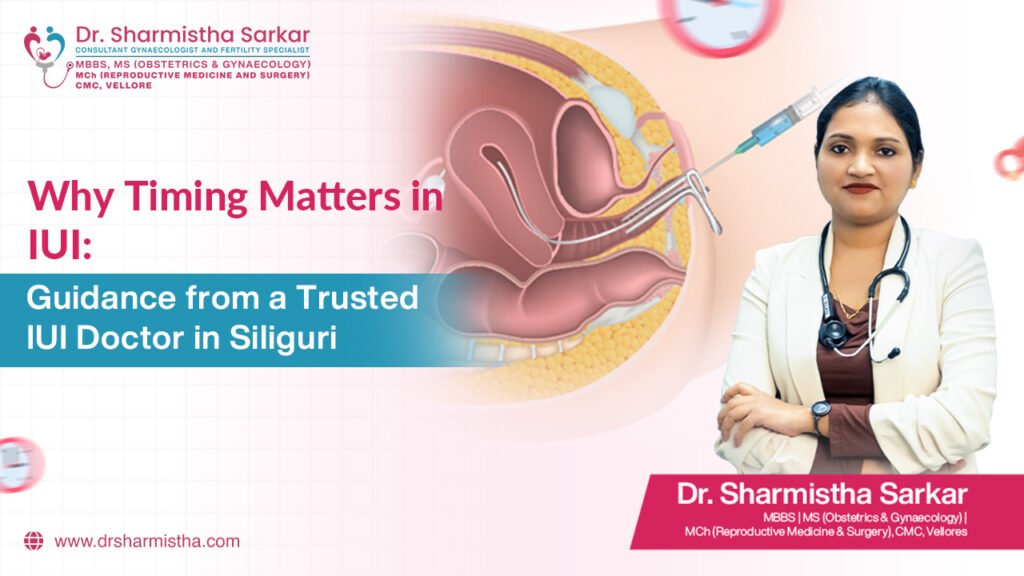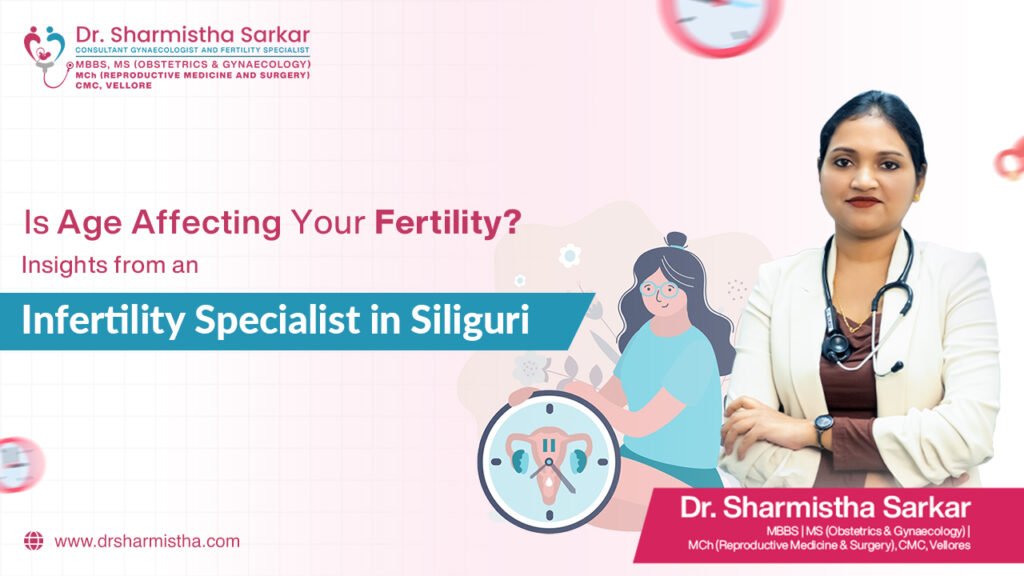Why Timing Matters in IUI: Guidance from a Trusted IUI Doctor in Siliguri
The most frequent question for couples looking for an IUI doctor in Siliguri is about the procedure’s schedule. Intrauterine insemination (IUI) is undoubtedly one of the most effective fertility treatments but its success is dependent on completing the procedure at the right time. Achieving the exact timing means the sperm meets the egg in the most fertile window. Dr. Sharmistha Sarkar, a well-regarded infertility specialist in Siliguri focuses on grasping the concept of timing in IUI is as important as the IUI treatment itself. In this blog, we will dive into why timing matters in IUI, the determination of the right window by doctors, and the reasons behind the huge benefits of consulting an IUI doctor in Siliguri for your fertility treatment. Getting to Know IUI Treatment IUI or intrauterine insemination is a fertility treatment wherein sperm is prepared and directly placed into the uterus. This is different from natural conception, where sperm has to go through the cervix to get to the egg. IUI eliminates this required process, thereby increasing the chances of fertilization. For IUI to be effective, the egg must be ready and available for fertilization. That is why the timing is critical. An egg remains viable for 12 to 24 hours post-ovulation, while a sperm can last for 3 to 5 days in the female reproductive system. Therefore, sperm should be deposited in the uterus as near to the ovulation period as possible. A proficient IUI doctor in Siliguri, Dr. Sharmistha Sarkar ensures that this tiny window is not overlooked. The doctor increases the likelihood of pregnancy by advanced techniques and careful monitoring of the woman’s cycle, ovulation patterns. Why Timing is the Key Factor in IUI In contrast to natural conception, IUI requires planning. If proper timing is not met, the cycle will turn out to be unproductive. This is why ovulation tracking and its precision is very important. Here is an explanation highlighting the importance of timing: Egg Viability: An egg can survive only for a short time after ovulation. Unless sperm is introduced within this time, fertilization will not be possible. Sperm Preparation: During an Intrauterine Insemination (IUI) procedure, the sperm is prepared and washed before being inserted into the uterus. Its motility can decline with time and therefore it is important to coordinate the insertion with ovulation. Hormonal Balance: As ovulation is stimulated with medications provided by an IUI doctor in Siliguri, the procedure is scheduled based on the IUI egg release medications. Maximizing Chances: The proper timing ensures that the sperm meeting the egg has the highest probability, which increases the chances of conception. When an experienced IUI doctor in Siliguri is consulted, couples need not worry as these essential aspects are taken care of. How Doctors Know When to Act Figuring out the best IUI timing requires close observation of the woman’s cycle. A skilled IUI doctor in Siliguri is likely to use a mix of the following techniques: 1. Tracking the Menstrual Cycle Doctors determine the fertile window by looking at the menstrual cycle’s length and consistency. If the cycle is 28 days, ovulation is expected on day 14 but this is subject to change. 2. Ovulation Predictor Kits (OPKs) These kits detect the surge in luteinizing hormone (LH), which is 24–36 hours before ovulation. Doctors often schedule IUI within this timeframe. 3. Ultrasound Monitoring Ultrasound scans are useful in following ovarian follicle development. Follicular growth to the appropriate size (usually 18–20 mm) indicates that ovulation is near. 4. Blood Tests Hormone levels in the blood, especially progesterone and LH help further confirm the timing of ovulation. 5. Trigger Injections On occasions that ovulation has to be triggered, HCG medications are employed. IUI is therefore planned 24-36 hours after the scheduled injection.All these procedures are aimed at ensuring insemination happens precisely when it needs to be done by the IUI doctor in Siliguri. Common Mistakes in Timing IUI No matter how prepared one is, timing errors can bring about difficulties, especially during conception attempts. Some of the frequent errors are: Planning conception for day 14 ovulation for everyone—This is especially inaccurate for women with irregular menstrual cycles. Not consulting experts—Depending solely on home ovulation testing strips can be inaccurate, and is best avoided. Failure to consider the condition of the sperm—Low motility and poor quality sperm are a huge issue and even the best timing cannot salvage the situation. Post-trigger window neglect – Delays following the HCG injection can lead to the ‘miss’ of an entire ovulation period. The expertise of an IUI doctor in Siliguri removes all doubts during monitoring and increases the success rate of timing during treatment. Selecting the Best IUI Doctor in Siliguri When looking for effective fertility treatments in the greater North Bengal area, the right infertility doctor in Siliguri is crucial. This is why Dr. Sharmistha Sarkar, an IUI doctor in Siliguri is the ideal choice owing to the following: Fine Checking: To make certain the treatment is on point, ultrasounds and hormonal checks are conducted. Custom Treatment: Defined treatment methods to match with the fertility problems of the individual. Complete Treatment: Helps you emotionally whilst giving you the right treatment. Improved Outcomes: The methodologies used improve the chances of getting pregnant with meticulous timing. Comprehensive Guidance: Due to the IUI treatment being complex, a reliable infertility specialist in Siliguri would also provide advice relating to lifestyle, diet, reproductive health, and other matters to complement the IUI treatment and make the entire treatment smoother. Dr. Sharmistha Sarkar is greatly commended for her proficiency and kind approach while dealing with couples, easing every aspect of their IUI treatment. Turning the Right Time into the Right Opportunity The timing of events is crucially important to IUI treatment success. The tracking of ovulation and setting the date for treatment must be perfectly synchronized for fertilization to take place. The gentle march from one milestone to the next might seem fraught with tension, but the steady hand of a reputable IUI doctor in Siliguri makes
Why Timing Matters in IUI: Guidance from a Trusted IUI Doctor in Siliguri Read More »



